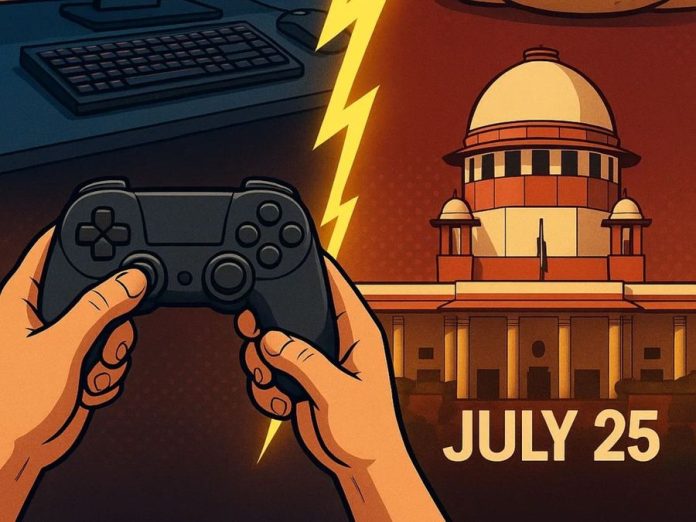Imagine building a tech-driven online gaming platform, creating jobs, attracting investors, and engaging millions of users—only to suddenly face retrospective tax notices worth over ₹1.12 lakh crore. That’s the reality India’s online gaming startups are grappling with today. Now, all eyes are on July 25, when the Supreme Court is set to take up this critical battle between India’s booming online gaming ecosystem and the 28% GST levy imposed on real money gaming.
This isn’t just a legal tussle—it’s a defining moment for one of the fastest-growing segments in India’s digital economy.
The Trigger: ₹1.12 Lakh Crore GST Show Cause Notices
In what the industry sees as a retrospective shocker, online gaming companies have been slapped with show cause notices demanding GST payments totaling a staggering ₹1.12 lakh crore. These notices cover alleged evasion for financial years 2022–23 and part of 2023–24, a period before the current GST regime for online gaming officially came into effect in October 2023.
Companies argue that the very foundation of this taxation move is flawed—both legally and constitutionally.
From October 1, 2023, India brought in a new GST framework that imposed a 28% tax on the full face value of bets placed on online games involving real money. This included skill-based games too—not just games of chance.
Before this, the GST treatment of online gaming was murky. Operators paid 18% GST on the platform fees (a.k.a. gross gaming revenue or rake), which is the commission platforms earned for facilitating games. But with the new law, the entire amount staked by players is treated as taxable—massively increasing the tax burden.
The Argument: “No Legal Basis for 28% Tax Before October 2023”
Appearing before the Supreme Court on behalf of the online gaming industry, senior advocate V Sridharan laid out a powerful case questioning the retrospective imposition of 28% GST.
Sridharan argued that:
-
The GST provisions before October 2023 did not empower the government to tax the full face value of bets.
-
Rule 31A of the GST Rules (2018)—which prescribes how to value bets and gambling—was not backed by the required notifications under Section 15(5) of the CGST Act.
-
There was no legal notification treating “actionable claims” like bets as taxable supplies before October 2023.
-
Online gaming was consistently treated as a service, and suddenly treating it as supply of goods lacks legislative clarity.
He added that prize pool contributions from players should not be considered a taxable consideration. Gaming platforms merely facilitate games between users and hold prize pools in trust for the winners, without making any supply themselves, he contended.
A Bigger Question: Is Online Gaming a “Service” or “Goods”?
This case brings back an old debate: Are online games services or goods?
For years, the government and tax authorities had treated gaming as a service. But post-October 2023, through amendments and rate notifications, the classification has shifted—confusing operators and investors alike.
The petitioners are calling out the incoherence and unpredictability in the taxation regime, which not only threatens their business models but also spooks global and domestic investors backing these platforms.
What the Bench Said
The two-judge bench—comprising Justices JB Pardiwala and R Mahadevan—heard the arguments and raised critical questions. At one point, the bench asked whether the entire game would be considered a “transaction” under GST.
To this, Sridharan responded, “GST is a contract-based tax,” implying that liability should be based on actual commercial transactions between parties—not assumed across a game ecosystem.
The online gaming industry in India has grown exponentially, with over 500 startups, billions in investment, and a user base crossing 400 million. However, this tax uncertainty has already caused:
-
Investor sentiment to dip, especially among foreign backers
-
Several startups to restructure or scale down operations
-
Startups to pivot away from real money gaming, fearing legal and financial backlash
The verdict in this case could either pave the way for a more stable policy environment, or further entrench the regulatory and fiscal confusion that has plagued this sunrise sector.
The Supreme Court is expected to take a final call on the matter on July 25, 2025, after hearing a consolidated set of petitions from across the gaming industry. Until then, the fate of India’s online gaming startups—once seen as the poster child of India’s digital economy—hangs in the balance.
Whether you’re an investor, policymaker, or a gaming entrepreneur, this case serves as a reminder of the urgent need for policy predictability in the tech and startup space. India’s regulatory stance will either empower or encumber innovation—there’s little middle ground left.
